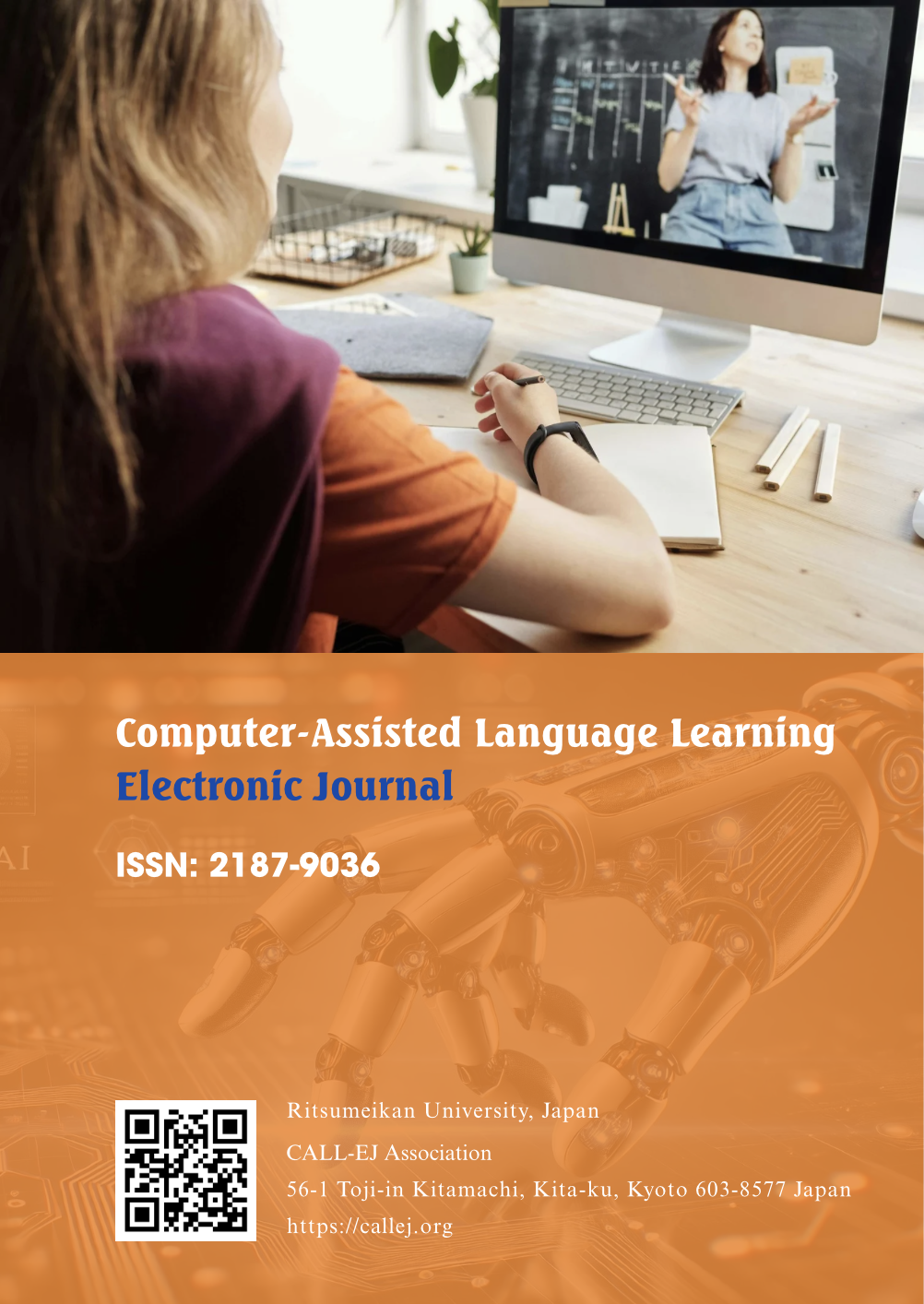Vietnamese EFL teachers’ and students’ perceptions of using Google Translate in the classroom
DOI:
https://doi.org/10.54855/callej.252638Keywords:
Google Translate (GT), English as a Foreign Language (EFL), Vietnamese studentsAbstract
Google Translate (GT) has become a widely used tool in EFL education. In Vietnam, GT is commonly used among EFL students, but few published studies have explored its use in classrooms. This research aims to fill that gap by examining the perceptions of both EFL teachers and students regarding their awareness, practices, and appropriateness of using GT in classrooms. It involved 450 students and 12 teachers in a Vietnamese private university. Its design included a cross-sectional survey and semi-structured interviews. The questionnaire design was based on the appraisal theory, and the ecological system theory was used to interpret data. The findings show that both students and teachers recognized GT’s value for learning English in classrooms, but teachers and English-majored students used it less than non-majored students. The results offer insights for educators, policymakers, and researchers on GT’s role in EFL education, promoting effective language instruction and ethical technology use.References
Alonso, A. N. (2022). Online Translators in Online Language Assessments. Computer Assisted Language Learning Electronic Journal (CALL-EJ), 23(3), 115-135.
Boyatzis, R. (1998). Transforming qualitative information: Thematic analysis and code development. Thousand Oaks: SAGE Publications, Inc.
Buckley, D., & Budzyna, D. (không ngày tháng). Ecological Theory. Pressbook. https://rotel.pressbooks.pub/whole-child/chapter/ecological-theory/#:~:text=The%20ecological%20systems%20theory%20holds,by%20nesting%20spheres%20of%20influence.
Can, S. (2023). Instructors' Perceptions of Students' Google Translate Use in Language Learning. Soylem Journal of Philology, 474-482. https://doi.org/10.29110/soylemdergi.1186593
Ducar, C., & Schocket, D. H. (2018). Machine translation and the L2 classroom: Pedagogical solutions for making peace with Google translate. Foreign Language Annals, 51, 779-795. https://doi.org/10.1111/flan.12366
Etikan, I., Musa, S. A., & Alkassim, R. S. (2016). Comparison of Convenience Sampling and Purposive Sampling. American Journal of Theoretical and Applied Statistics, 5(1), 1-4. https://doi.org/10.11648/j.ajtas.20160501.11
Fraenkel, J., Wallen, N., & Hyun, H. (2012). How to design and evaluate research in education. (8th, Biên tập viên) New York: McGraw-Hill Humanities.
Gunawan, F., & Khairunnisa, A. (2023). Lecturer's Perception of Google Translate as an Academic Tool: Appraisal Analysis. Indonesian Journal of EFL and Linguistics, 8(1). https://doi.org/10.21462/ijefl.v8i1.606
Hoang, D. T., Johnson, N. F., & McAlinden, M. (2022). Students’ Perceptions and Real-Life Use of Mobile Technologies in EFL Learning. Computer Assisted Language Learning Electronic Journal (CALL-EJ), 23(3), 186-206.
Jolley, J. R., & Maimone, L. (2015). Free online machine translation: Use and perceptions by Spanish students and instructors. In A. J. Moeller (Ed.), Learn languages, explore cultures, transform lives (pp. 181-200). 2015 Central States Conference on the Teaching of Foreign Languages.
Lee, S. M. (2020). The impact of using machine translation on EFL students’ writing. Computer Assisted Language Learning, 33(8), 1571-1575. https://doi.org/10.1080/09588221.2018.1553186
Maamuujav, U., Olson, C. B., & Chung, H. (2021). Syntactic and lexical features of adolescent L2 students’ academic writing. Journal of Second Language Writing, 53. https://doi.org/10.1016/j.jslw.2021.100822
Martin, J. R., & White, P. R. (2005). The Language of Evaluation: Appraisal in English. New York: Palgrave Macmillan. https://doi.org/10.1057/9780230511910
Mundt, K., & Groves, M. (2016). A double-edged sword: the merits and the policy implications of Google Translate in higher education. European Journal of Higher Education. https://doi.org/10.1080/21568235.2016.1172248
Muzdalifah, I., Handayani, S., & Walhidyat, &. (2020). Improving English Speaking Competence by Using Google Translate on Campus Environment. IOP Conference Series: Earth and Environmental Science. 469. International Conference on Environment and Technology. https://doi.org/10.1088/1755-1315/469/1/012039
Nguyen, H. T., & Khau, H. A. (2021, November). Investigating Teachers’ and Graduates’ Remarks on the Translation of English Modals into Vietnamese Provided by Google Translate. GEMA Online Journal of Language Studies, 21(4), 172-185. https://doi.org/10.17576/gema-2021-2104-09
Nguyen, N. T., Tran, T. T., Nguyen, A. N., Lam, P. H., Nguyen, S. H., & Tran, T. N. (2025). The Benefits and Challenges of AI Translation Tools in Translation Education at the Tertiary Level: A Systematic Review. International Journal of TESOL & Education, 5(2), 132-148. https://doi.org/10.54855/ijte.25527
Oteiza, T. (2017). The appraisal framework and discourse analysis. Trong Routledge, The Routledge Handbook of Systemic Functional Linguistics (trang 457 - 472). Routledge.
Oxford, R. L. (1990). Language learning Strategies. Boston: Heinle and Heinle Publications.
Pham, A. T., Nguyen, Y. N., Huynh, K. D., Le, N. T., & Huynh, P. T. (2022). University Students’ Perceptions on the Use of Google. International Journal of Emerging Technologies in Learning (iJET), 17(4), 79-94. https://doi.org/10.3991/ijet.v17i04.28179
Pham, D. T., & Luong, H. M. (2025). Students’ Challenges in Employing AI Tools in Legal Writing. International Journal of TESOL & Education, 5(2), 75-86. https://doi.org/10.54855/ijte.25524
Phan, N. T., & Chen, C. (2020). Vietnamese Engineering Students' Perceptions of the use of Google Translation tool. Journal Of Science And Technology, 48(6), 156-165. https://doi.org/10.46242/jst-iuh.v48i6.1610
Roopa, S., & Rani, M. (2012). Questionnaire Designing for a Survey. J Ind Orthod Soc, 46(4), 273-277. https://doi.org/10.5005/jp-journals-10021-1104
Spencer, M. B. (1995). Old issues and new theorizing about African–American youth: A phenomenological variant of ecological systems theory. Trong R. L. (Ed.), Black youth: Perspectives on their status in the United States (trang 37-69). Westport, CT: Praeger.
Spencer, M. B., Dupree, D., & Hartmann, T. (1997). A Phenomenological Variant of Ecological Systems Theory (PVEST): A self-organization perspective in context. Development and Psychopathology, 9(04), 817-833. https://doi.org/10.1017/s0954579497001454
White, P. (2015). Appraisal Theory. Trong I. John Wiley & Sons, & K. Tracy (Biên tập viên), The International Encyclopedia of Language and Social Interaction. John Wiley & Sons, Inc. https://doi.org/10.1002/9781118611463/wbielsi041
Yin, R. K. (2003). Case Study Research: Design and Methods. Thousand Oakds: Sage Publication.
Downloads
Published
Issue
Section
License
Copyright (c) 2025 Author and CALL-EJ

This work is licensed under a Creative Commons Attribution 4.0 International License.
Copyright of articles is retained by authors and CALL-EJ. As CALL-EJ is an open-access journal, articles are free to use, with proper attribution, in educational and other non-commercial settings. Sources must be acknowledged appropriately.

